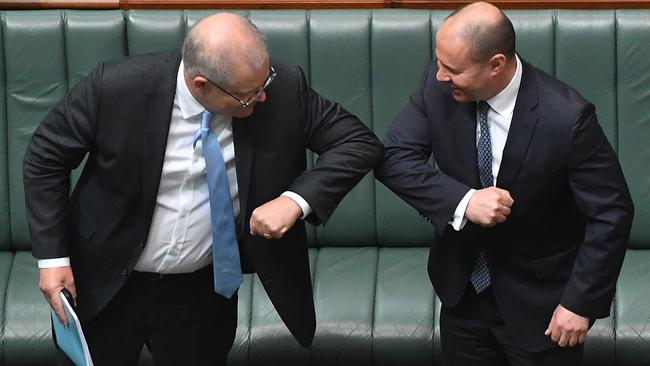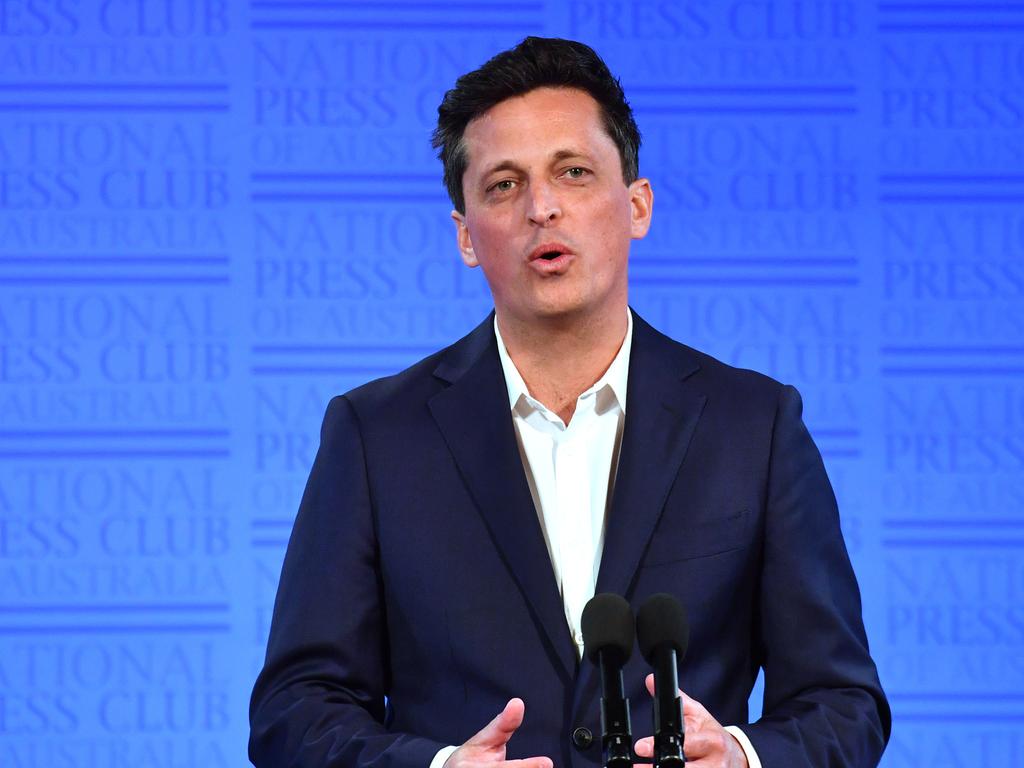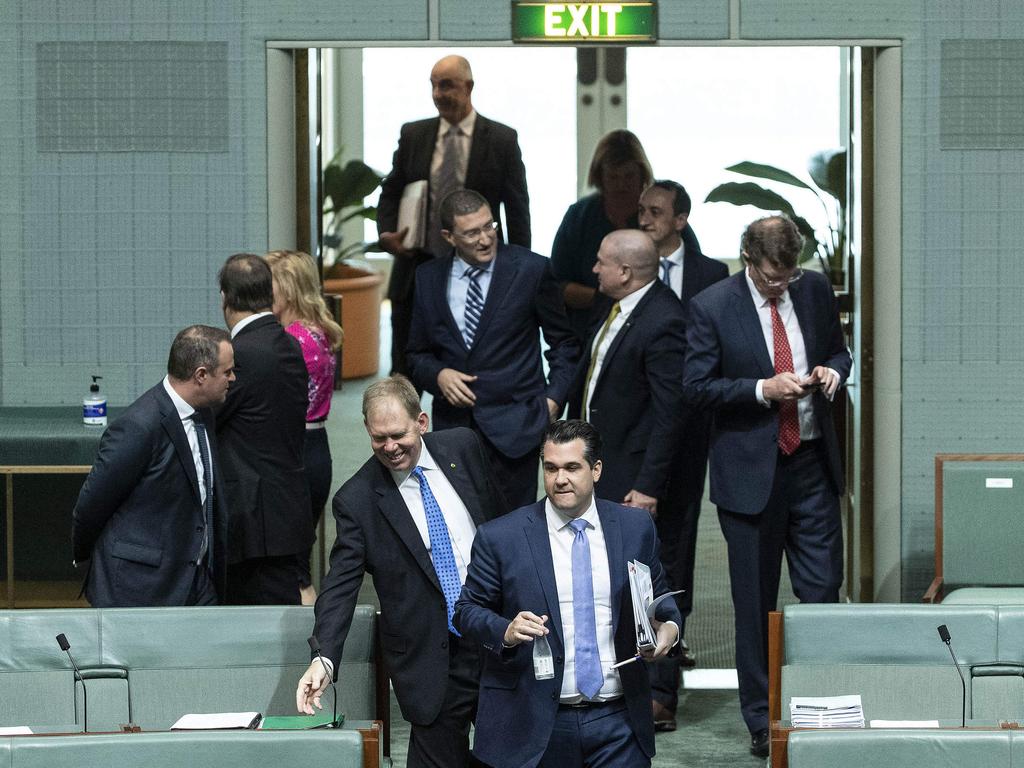Coronavirus: Heavyweights push for let-up on six-month hibernation plan
Richard Goyder has questioned the six-month business hibernation strategy and wants a swifter relaxing of restrictions.

Corporate heavyweight Richard Goyder has questioned the government’s six-month business hibernation strategy and made the economic case for a swifter relaxing of tough COVID-19 restrictions.
Mr Goyder — chairman of Qantas, Woodside Petroleum and the AFL Commission — warned that the balance between managing the health and economic crises would become harder over time as the virus stretched Australia’s capacity to invest and repay debt.
He was supported by Tony Shepherd, chairman of the Abbott government’s 2015 Commission of Audit, who said the longer the shutdown lasted, “the longer it takes to get the economic flywheel moving again”.
Seven Group chief executive Ryan Stokes also cautioned the federal government against adopting a prolonged coronavirus lockdown. “Once we’re through this, restarting or stimulating the economy will be a massive undertaking,’’ Mr Stokes told The Australian. “So I think the quicker we’re through and allow business to get back to normal, I think there will need to be a really strong focus on how to stimulate activity and encourage business back.”
While the business leaders praised the government’s handing of the COVID-19 crisis and were not calling for an immediate relaxation of social-distancing restrictions, they believe the longer the economy is forced into hibernation, the more difficult it will be to restore growth.
Scott Morrison told parliament on Wednesday the government was fighting the twin crises of saving lives and livelihoods.
“Through the actions we have taken to date, we have bought valuable time to chart a way out over the next six months,’’ the Prime Minister said.
“But there are no guarantees and it could well take far longer.’’
Mr Shepherd said that parts of Mr Morrison’s economic rescue package would “not be able to be removed immediately” when the coronavirus threat began to ease in six months’ time.
The warnings on Wednesday came as Standard & Poor’s became the first ratings agency to signal it could qualify its AAA rating for Australia with a “negative outlook”. It pointed to a “substantial deterioration” in public finances and a doubling of net government debt next year to 32 per cent of GDP.
Mr Goyder, a former chief executive of Wesfarmers, said Australians would have to prepare for a reopening of the economy without a vaccine, arguing that more businesses would fail the longer the shutdown continued.
“It can’t be you’ve got to stay at home for the rest of your life,” he said. “I don’t understand this herd immunity thing, but if we don’t get a vaccine or we won’t get one for some time, then we are going to have to work our way through this without destroying the economy.
“With a very strong proviso that I don’t have the medical background — the PM and national cabinet have done a really good job — but six months feels too long to me.
“I just don’t know how businesses large and small can go back to where they were if it’s six months. Some will survive and some won’t. But the list of casualties grows … I like the word hibernation. I like the concept. But hibernation is you actually go and do nothing, and we can’t do that.
“Australians have been really good, but the narrative is going to get harder because the (health) successes are evident … The best solution to business getting back on their feet is to allow things to open up a bit, and I’m not underestimating how difficult that is.”
Former ANZ chief economist Warren Hogan — now a professor at the University of Technology Sydney — said social isolation rules were subtracting $13bn from economic output every month. “The ‘easy’ part is done, the hard part is extracting ourselves from all these government support measures, and the sooner we get rid of this stuff, the better,” he said.
Mr Shepherd told The Australian a pragmatic approach to reopening the economy was needed, noting the resources and construction sectors were “continuing to operate under very strict controls” which had “proved … successful”.
He proposed a ramping-up of accelerated depreciation programs, a company tax holiday and a temporary diversion of compulsory superannuation contributions into wages as possible ways of recharging growth as Australia emerged from the crisis.
Mr Goyder and Mr Shepherd argued that elderly and at-risk groups would need to be quarantined or protected in the event of an early reopening of the economy and that hibernating sectors would need to be awakened “bit by bit” and subject to tight controls and constant vigilance.
Mr Shepherd said: “We have to look at the sector and say can we put in controls and processes which ensure or reduce the chances of transmission and, in the event of transmission, enable us to cauterise or deal with that transmission quickly and prevent further spreading.”
Bank of Queensland chief executive George Frazis also expressed concern about how long the hibernation period would last.
“The longer this takes, the harder it’s going to be for businesses to come through this, not to mention the personal toll on families and individuals,” he said.
“The government has done a great job on that (testing). It’s definitely worthwhile doing more testing, to be able to release the constraints sooner. More random testing, more localised testing, will mean that we can with confidence start freeing up how people behave, how people live and how business operates. It’s still a while away (loosening constraints) but I definitely worry about if what we are talking about is waiting for a vaccine, because that is a long way away in terms of making sure good businesses survive this.”
Health Minister Greg Hunt said on Wednesday the government was standing firm by its six-month hibernation timeline and offered a comprehensive rejection of “herd immunity”.
“We are very clear that we believe that this is a six-month process,” Mr Hunt said. “That doesn’t mean all of the restrictions are in place … but for the time being we need to consolidate, to suppress the virus and to win that battle.”
He said that embracing herd immunity would result in coronavirus being contracted by 60 per cent of the population, 15 million people, and if there was a 1 per cent fatality rate, it would result in a “catastrophic loss of human life”.
ANZ economists forecast on Wednesday that the government’s massive boost to spending and a collapse in tax receipts would drive a federal budget deficit of $110bn in this financial year, and a massive $200bn deficit in 2020-21.
These deficits would be equivalent to around 10 per cent of GDP in 2020-21.
Additional reporting: Joyce Moullakis, Richard Ferguson






